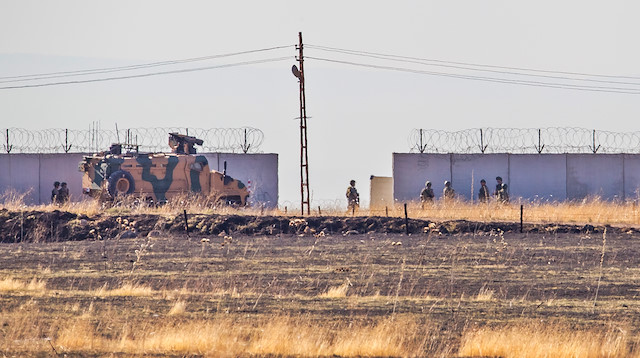

File photo: Russian and Turkish forces are seen durign the third ground patrol in northern Syria
Russia will do its part and we hope that our partners will keep their word, says Russian Foreign Ministry spokeswoman
Russia said on Friday that it was working "actively" with Turkey to implement a memorandum between the two countries on Syria.
In a press conference in Moscow, Russian Foreign Ministry spokeswoman Maria Zakharova told reporters that Moscow would do its part to execute the deal.
"We believe Russia will do its part and we hope that our partners will keep their word. We are working very actively on this," said Zakharova.
On Nov. 1, Turkish and Russian military personnel launched joint ground patrols in northern Syria under the memorandum, sealed by the presidents of the two countries on Oct. 23 in Sochi, Russia.
Turkey cleared some northern parts of Syria of terrorists during Turkey’s Operation Peace Spring -- launched on Oct. 9 to eliminate terrorists from northern Syria east of the Euphrates River in order to secure Turkey’s borders, aid in the safe return of Syrian refugees and ensure Syria’s territorial integrity.
Ankara wants YPG/PKK terrorists to withdraw from the region so that a safe zone can be created to pave the way for the safe return of some 2 million refugees.
In its more than 30-year terror campaign against Turkey, the PKK -- listed as a terrorist organization by Turkey, the U.S. and the European Union -- has been responsible for the deaths of 40,000 people, including women, children and infants. The YPG is the Syrian offshoot of the PKK.
Iran and JCPOA
Stressing that Iran had proved many times to be a "responsible fighter against terrorism", Zakharova condemned U.S. "attempts to demonize Iran" and represent the country "as a terrorist threat".
She accused western media of covering Iran's suspension of compliance with parts of the Joint Comprehensive Plan of Actions (JCPOA) nuclear deal, while neglecting to mention the fact that the country's actions were both reversible and motivated by the inability of the European parties to the JCPOA to implement their part of the agreement.
"The course, taken by the United States of America to confront Iran, is destructive and simply short-sighted. Without Tehran's participation, the construction of a solid regional security architecture in the Middle East is impossible, as well as the stabilization of the situation in Syria, Iraq and Afghanistan," she said.
Iran began to halt its commitments under the 2015 deal in retaliation following the unilateral decision by the U.S. to withdraw from the agreement, and the EU’s failure to fulfill its commitments.
Iran started injecting gas into centrifuges at its underground Fordow nuclear facility on Wednesday, in the presence of inspectors from the UN nuclear watchdog IAEA, according to the state television, in a fourth step of commitment suspension.
The nuclear agreement was signed in 2015 between Iran and Russia, China, France, the U.K., and the U.S., plus Germany. However, last year U.S. President Donald Trump unilaterally withdrew from the deal and intensified pressure on Tehran by re-imposing sanctions targeting the country’s energy and banking sectors.
Lebanon protests
Addressing ongoing mass protests in Lebanon, Zakharova said there had been "positive dynamics" in resolving the political crisis in the country, but that the situation was "still far from normalization". She welcomed Lebanon’s President Michel Aoun's readiness to meet with representatives of the opposing sides, calling on political opponents to find a solution in a legal framework.
Mass protests erupted across Lebanon last week against plans to tax calls on WhatsApp and other messaging services. The demonstrations quickly turned to wider grievances with calls for resignation of the government and trial of corrupt officials.
Lebanon suffers from high unemployment, sluggish economic growth and one of the highest debt ratios in the world, with the debt burden reaching $86.2 billion in the first quarter of 2019, according to the country's Ministry of Finance.
Prime Minister Saad Hariri announced his resignation Tuesday amid ongoing protests, but Aoun urged him to remain in his post until a new government could be established.
Venezuela
Describing recent talks as "encouraging", in which the Venezuelan government and opposition National Assembly agreed on a new composition of the country's election commission, Zakharova said this was a "first real step" towards overcoming the crisis in the country.
Earlier, the opposition met with the representatives of the Maduro government to discuss the new composition of the Venezuelan principal election body, the National Electoral Council.
"We consider this as the first real step towards overcoming the institutional crisis and the collective search for agreed solutions to domestic political issues in accordance with the constitution," she said.
Zakharova also blamed the U.S. of double standards, saying the U.S. Treasury's sanctions on the country made exemptions for American companies operating in the country.
Commenting on protests in Bolivia, she said appeals to drive the government from power did not contribute to normalization.
As for demonstrations in Haiti, she said the main source of the problems was the absence of power. She called "all constructive powers" to form a coalition government aiming to address existing problems.
#Iran nuclear deal
#Joint Comprehensive Plan of Action (JCPOA)
#Maria Zakharova
#Venezuelan crisis

